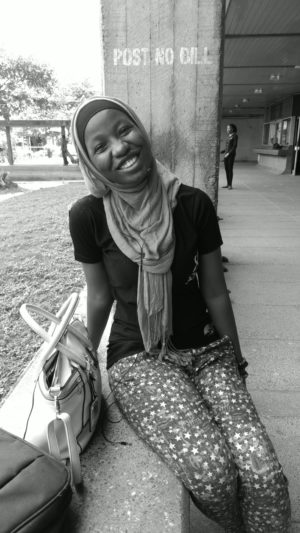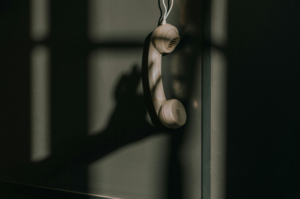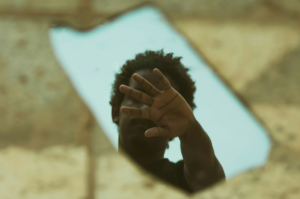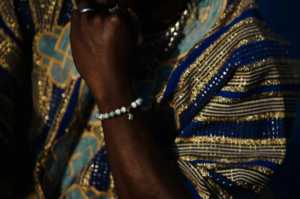“Then she would see a cockroach on her bedroom wall, staring back at her languidly as it cleaned its antennas with long, lavish strokes. The anger would bubble in her throat and her mother’s voice would sing to her from a long gone time.”
***
She stood at MMIA, watching her husband go and trying not to cry. She was oddly reminded of the scenes she had seen in movies, spectacles of women who wailed like widows and threw themselves against the earth when their sons and husbands went off to war. She winced at her own silliness and waved at his retreating back, holding on to the Little One with her other hand. All around her people came and went, travelers moving with the stiff and slightly oppressive grace their money afforded them, cocooned in the aura of the privileged few. She mused at that, filing it away in her head the way you would find an odd knickknack lying around while you dusted the room and leave it in the desk drawer, not quite sure what it was meant for but certain it had some important use.
She would retrieve it that night after the long drive back home. The Little One would fall asleep in the car and she would put her gently to bed, then sit at her desk and bend over her bulging belly to write. If her husband hadn’t left, he would have laughed at her again, wondering aloud why anyone who owned an expensive and very sophisticated computer would insist on writing with an old fashioned pen and plain paper. He would have come up behind the chair and peered into her work, his chin softly nestled in her hair, and then say that she had such talent and seriously ought to write a book and get it over with. He would have done that, because it was his way to stir and calm her in one breath, an habit she still couldn’t decide whether she hated or adored.
She would write that night while her husband flew over the Atlantic, about travelers who had too much money and travelers who had too little money and how they all strove to meld as one. Then on a whim, she would mail it to the local newspaper and they would publish it in the Sunday Editorial. Then the messages would begin to come, people who would think her piece was delightful and she was brilliant, people who would want to know what she also thought of music and culture and Germany and fashion and so many things she knew nothing about. She would be slightly amused, registering how quick people were to idolize anyone who seemed to know the slightest bit about something they had never thought about. Her husband would call and she would tell him about the piece and they would both laugh, dry cackles over a wiry phone line. He would ask about the Little One and the Baby and she would smile, as though he could see her, and say that they were all fine. His voice would get husky and breathy and he would murmur into her ears how much he missed her. She would say she missed him too and she would close her eyes and think of him, of his tall, warm body and his round mouth that was always quivering with mischief. Her hands would wander, revisiting old familiar places, places just the both of them knew of.
Then one Friday morning, the Baby would finally come. The Little One would jump around, happy to have a sister. Her husband would call and she would tell him their daughter had arrived. He would tell her how happy and sorry he was, happy he was a father again and sorry that he had missed watching it happen. She would smile and say it was fine, they were all fine. She would take pictures of the three of them and send them to him and he would say the baby looked like her and she looked beautiful and so did the Little One and he missed them all terribly.
Then the Little One would come home from school one day with a letter that said her parents had to come see the Principal. She would go and the Principal would tell her how wonderful her daughter was and how a group of foreigners would like to do a documentary on her.
“It’s part of the prize for winning their annual national debate contest. Just something very short, on her family and life outside school. Your daughter is wonderful, really. She’s such an exemplary student, and I’m not just saying that because she’s the Senior Prefect. We would like to include the footage in the school’s gallery as well, a shining example for every student here. When will your husband arrive so we can discuss the details?”
She would smile then, a small strained smile, and say that he was at war. The Principal would blink and mumble some awkward words. Her husband would call that night and she would tell him about the prize and he would talk to the Little One for a long time. He would ask about the Baby and he would talk to her too and he would laugh with her.
She would call and ask her husband when he was coming home and he would say sigh and say, “Soon,” and talk about expired visas and immigration police and deported people. She would stop talking.
Then the Little One would go away to the University and when she came home she would talk very loudly and wear black lipstick and play a lot of music on very loud earphones. There would be a lot of screaming and shouting and banging of doors and staring at ceilings late into the night.
She would call and ask her husband when the three of them could come to him and he would pause and say, “I need a little more time,” and tell her stories of detention centers and arranged marriages and illegal immigrants. This time, she would tell him to stop talking.
Then the Baby would go away to boarding school and when she came home she would have scars on her skin and patches of yellow on her neck and back. There would be a lot of tears and cries and pleas and finally a change of schools.
Then she would see a cockroach on her bedroom wall, staring back at her languidly as it cleaned its antennas with long, lavish strokes. The anger would bubble in her throat and her mother’s voice would sing to her from a long gone time….
“Pa kini yen o! You must kill it! It is that your wicked grandmother’s spirit, I am sure. Look at her flying! Oya kill it now!”
She would raise her worn slipper and fling it at the creature and, when it fell to the ground, she would batter it repeatedly with the fallen slipper until it was nothing but a smear of smelly black mush. She would flush it down the toilet, with grim satisfaction that some old wizened hag was spluttering and coughing up blood in her evil slumber.
Then the phone would ring and it would be an old acquaintance from back home. The friend would….
“…mean no harm but I just thought it was not fair that you didn’t know. Nobody wants to tell you anything but me I will talk. Your husband has married Oyinbo ooo. One dirty white thing like that! Hian! She came home last Christmas with their children. Two fine boys, very fine like their father. They said he was busy with work…hmmm…. Me, I was asking everybody why you didn’t come o and they said they called you and you didn’t answer. Why, ehn? We didn’t offend you na. Abi is it because your husband now has filling station, you no send us again, ehn? Abi that big hotel that he built, which one….”
The friend would keep talking for a long time but she would not be listening anymore. Her head would swell and she would see black and red, thick black flowing in leaky pipes in her head, mixing with red blood and bursting out at the sides, squirting her life and soul out into the waiting mouths of her husband and his white family.
She would go on a drive, a very long drive and find herself at the gates of the University. She would go in to see the Little One and knock at her door for an hour. Then she would remember that the Little One had left the University and was up in the North serving the Nation.
She would drive back home and the Baby would be there. The boy from across the street would be there too, the one with the thick glasses that hid quirky eyes. She would stand at the door and watch them both talk, about politics and books and movie stars and ‘uni’. Her throat would start to scratch and she would turn and stumble into her room. She would wonder where she had left her pen and paper. She would search the whole room but wouldn’t find them.
Then she would sink to the floor beside her desk, a broken, defeated heap slump in her shaking shoulders and she would remember the day she had stood at MMIA, watching her husband go and trying not to cry.
**************
About the Author:
Post image by Phillip Capper via Flickr.
 Zulaikhah is a second year Building student at the University of Lagos, writer at www.frandela.wordpress.com, media addict, literature lover and devoted music worshiper.
Zulaikhah is a second year Building student at the University of Lagos, writer at www.frandela.wordpress.com, media addict, literature lover and devoted music worshiper.










Daniel Opara March 05, 2017 05:48
Wow, impressive piece Zulai. Keep it up.